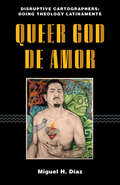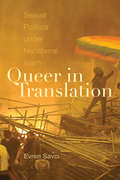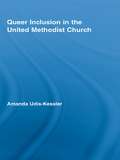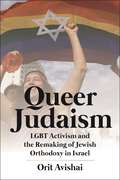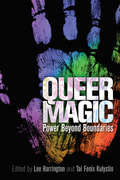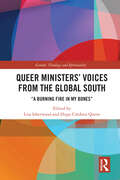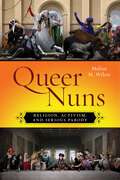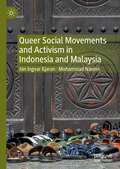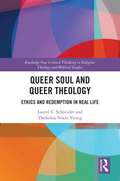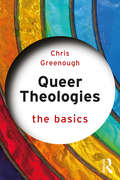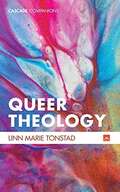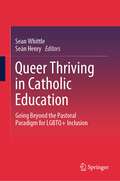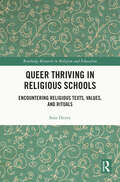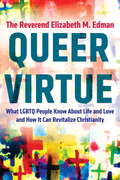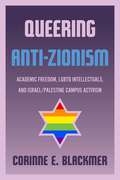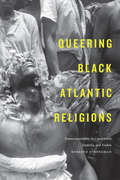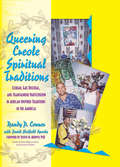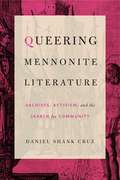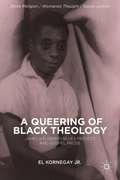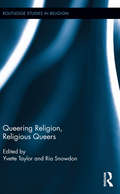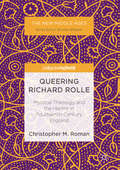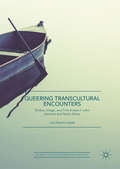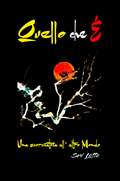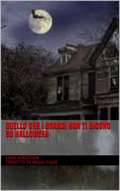- Table View
- List View
Queer God de Amor (Disruptive Cartographers: Doing Theology Latinamente)
by Miguel H. DíazQueer God de Amor explores the mystery of God and the relationship between divine and human persons. It does so by turning to the sixteenth-century writings of John of the Cross on mystical union with God and the metaphor of sexual relationship that he uses to describe this union. Juan’s mystical theology, which highlights the notion of God as lover and God’s erotic-like relationship with human persons, provides a fitting source for rethinking the Christian doctrine of God, in John’s own words, as “un no sé qué,” “an I know not what.”In critical conversations with contemporary queer theologies, it retrieves from John a preferential option for human sexuality as an experience in daily life that is rich with possibilities for re-sourcing and imagining the Christian doctrine of God. Consistent with other liberating perspectives, it outs God from heteronormative closets and restores human sexuality as a resource for theology. This outing of divine queerness—that is, the ineffability of divine life—helps to align reflections on the mystery of God with the faith experiences of queer Catholics. By engaging Juan de la Cruz through queer Latinx eyes, Miguel Díaz continues the objective of this series to disrupt the cartography of theology latinamente.
Queer in Translation: Sexual Politics under Neoliberal Islam (Perverse Modernities: A Series Edited by Jack Halberstam and Lisa Lowe)
by Evren SavciIn Queer in Translation, Evren Savcı analyzes the travel and translation of Western LGBT political terminology to Turkey in order to illuminate how sexual politics have unfolded under Recep Tayyip Erdoğan's AKP government. Under the AKP's neoliberal Islamic regime, Savcı shows, there has been a stark shift from a politics of multicultural inclusion to one of securitized authoritarianism. Drawing from ethnographic work with queer activist groups to understand how discourses of sexuality travel and are taken up in political discourse, Savcı traces the intersection of queerness, Islam, and neoliberal governance within new and complex regimes of morality. Savcı turns to translation as a queer methodology to think Islam and neoliberalism together and to evade the limiting binaries of traditional/modern, authentic/colonial, global/local, and East/West—thereby opening up ways of understanding the social movements and political discourse that coalesce around sexual liberation in ways that do justice to the complexities both of what circulates under the signifier Islam and of sexual political movements in Muslim-majority countries.
Queer Inclusion in the United Methodist Church (New Approaches in Sociology)
by Amanda Udis-KesslerThe United Methodist Church has been in conflict over lesbian/gay/bisexual/transgender inclusion issues since 1972. That year, in response to the gay liberation and gay rights movements, wording was added to the UMC Book of Discipline (the compilation of denominational policies and doctrines) characterizing homosexuality as "incompatible with Christian teaching." Since then, United Methodist ministers have been forbidden to perform same-sex commitment ceremonies (and United Methodist churches forbidden to host them), a rule has been passed that non-heterosexual United Methodist ministers must be celibate, and the UMC has forbidden the funding of any program or organization "supporting" homosexuality. These policies have been met with significant resistance by those fighting for GLBT inclusion. In this groundbreaking book, Udis-Kessler examines this struggle, analyzing both sides of this divisive debate among one of the most prominent religious organizations in the United States.
Queer Judaism: LGBT Activism and the Remaking of Jewish Orthodoxy in Israel
by Orit AvishaiOffers a compelling look at how Orthodox Jewish LGBT persons in Israel became more accepted in their communities.Until fairly recently, Orthodox people in Israel could not imagine embracing their LGBT sexual or gender identity and staying within the Orthodox fold. But within the span of about a decade and a half, Orthodox LGBT people have forged social circles and communities and become much more visible. This has been a remarkable shift in a relatively short time span. Queer Judaism offers the compelling story of how Jewish LGBT persons in Israel created an effective social movement.Drawing on more than 120 interviews, Orit Avishai illustrates how LGBT Jews accomplished this radical change. She makes the case that it has taken multiple approaches to achieve recognition within the community, ranging from political activism to more personal interactions with religious leaders and community members, to simply creating spaces to go about their everyday lives. Orthodox LGBT Jews have drawn from their lived experiences as well as Jewish traditions, symbols, and mythologies to build this movement, motivated to embrace their sexual identity not in spite of, but rather because of, their commitment to Jewish scripture, tradition, and way of life. Unique and timely, Queer Judaism challenges popular conceptions of how LGBT people interact and identify with conservative communities of faith.
Queer Magic: Power Beyond Boundaries
by Lee Harrington Tai Fenix KulystinIn a wide variety of pagan paths, many forms of modern magic and mystery hold an expectation that all parties are heterosexual, cisgender, and, in many cases, white. In Queer Magic: Power Beyond Boundaries, Lee Harrington and Tai Fenix Kulystin bring together a diverse and passionate collection of authors and artists who break out beyond that belief and explore how being LGBT+ is not just acceptable when exploring magic, but powerful. Using the diverse tools of queer activism, education, and storytelling, through academic essays and first-person narratives to comics and poster-style art, this intersectional group exposes a world beyond what so many magical practitioners have presumed is "normal." The reality is that magic, whether in Wicca or Vodou, Heathenry or Polytheism, has been fueled by people and systems beyond the binary for millennia. For many within, magic and queerness are not separate, but deeply entwined pieces of identity, worldview, and culture experienced together, always. Drag queen magic, Inclusive witchcraft, and magic for healing and survival. Gender transition in Rome, possession practices, and DIY divination. Social justice, queer black tantra, and polarity beyond gender. Honoring ancestors, fluidity of consciousness, and reimagining the Great Rite. Queer sex magic, power sigils, deities that reflect diversity... and more. Whether you identify as lesbian, gay, bisexual, asexual, transgender, agender, genderqueer, or some other queer orientation, or you are curious about tools to access magic beyond what is often discussed, this book is for you. Each piece is a unique and passionate chance to look into your own relationship with magic, break out of the tales of what your practice "should" look like, and expand your awareness into the queer magic as well as your own power beyond boundaries.
Queer Ministers’ Voices from the Global South: "A Burning Fire in My Bones" (Gender, Theology and Spirituality)
by Lisa Isherwood Hugo Córdova QueroThis book brings together the narratives of diverse ministers from the Global South in order to show that queer theologies are impacting many parts of the world and queer lives are molding and enriching Christian ministry. Across Asia, Africa, and Latin America, we are witnessing the emergence of queer faith-based communities in very different contexts and with very different histories. The perspectives included in the book form a tapestry that honors diversity among the Global South’s queer communities and ministries. They demonstrate the various ways in which queer ministry challenges and changes theological understanding as well as religious practice. Each chapter highlights issues pertaining to liturgy, sacraments, pastoral rites, and the personal faith journey that each minister underwent to foster pastoral queer theologies. Contributors focus on their understanding of the relationship between faith and sexuality, how rituals relate to the daily lives of queer believers, and the struggles they face within the political structures of religious institutions. The narratives highlight some of the challenges and mechanisms deployed to cope with ingrained LGBTIQ+ phobia. They also evidence how communities enact interreligious and multi-religious dialog and rituals while honoring faith and activism, and how prophetic ministries counter oppressive discourses and colonial performativities. This is a valuable resource for academics and religious leaders interested in the study of queer theologies, Asian, African, and Latin American Christianity, as well as ecclesiastical and liturgical issues.
Queer Nuns: Religion, Activism, and Serious Parody (Sexual Cultures #33)
by Melissa M. WilcoxAn engaging look into the Sisters of Perpetual Indulgence, queer activists devoted to social justice The Sisters of Perpetual Indulgence make up an unlikely order of nuns. Self-described as “twenty-first century queer nuns,” the Sisters began in 1979 when three bored gay men donned retired Roman Catholic nuns’ habits and went for a stroll through San Francisco’s gay Castro district. The stunned and delighted responses they received prompted these already-seasoned activists to consider whether the habits might have some use in social justice work, and within a year they had constituted the new order. Today, with more than 83 houses on four different continents, the Sisters offer health outreach, support, and, at times, protest on behalf of queer communities. In Queer Nuns, Melissa M. Wilcox offers new insights into the role the Sisters play across queer culture and the religious landscape. The Sisters both spoof nuns and argue quite seriously that they are nuns, adopting an innovative approach the author refers to as serious parody. Like any performance, serious parody can either challenge or reinforce existing power dynamics, and it often accomplishes both simultaneously. The book demonstrates that, through the use of this strategy, the Sisters are able to offer an effective, flexible, and noteworthy approach to community-based activism. Serious parody ultimately has broader applications beyond its use by the Sisters. Wilcox argues that serious parody offers potential uses and challenges in the efforts of activist groups to work within communities that are opposed and oppressed by culturally significant traditions and organizations – as is the case with queer communities and the Roman Catholic Church. This book opens the door to a new world of religion and social activism, one which could be adapted to a range of political movements, individual inclinations, and community settings.
Queer Social Movements and Activism in Indonesia and Malaysia
by Jón Ingvar Kjaran Mohammad NaeimiThis book examines queer activism and queer social movements (QSMs) in Indonesia and Malaysia, broadly engaging with these topics on three different levels: macro (global and national discourses), meso (organizational level – activities), and micro (individual – the activist). The micro level perspective allows for moving beyond the “traditional” political movement paradigm by understanding activism in Foucauldian terms as the ethics of the self (Foucault, 1984). In other words, the queer subject is seen as an active agent in taking care of the self by queering/resisting gender norms as well as heteronormative practices and regimes in their social environment through embodiment and actions. This kind of ethical being has the potential to build support and community between and amongst individuals.
Queer Soul and Queer Theology: Ethics and Redemption in Real Life (Routledge New Critical Thinking in Religion, Theology and Biblical Studies)
by Laurel C. Schneider Thelathia Nikki YoungThis book takes up the question of Christian queer theology and ethics through the contested lens of "redemption." Starting from the root verb "to deem," the authors argue that queer lives and struggles can illuminate and re-value the richness of embodied experience that is implied in Christian incarnational theology and ethics. Offering a set of virtues gleaned from contemporary lesbian, gay, bisexual, transgender, intersex, queer, and asexual (LGBTIQA) lives and communities, this book introduces a new framework of ethical reasoning. Battered and wrongly condemned by life-denying theologies of redemption and dessicating ethics of virtue, this book asserts that the resilience, creativity, and epistemology manifesting in queer lives and communities are essential to a more generous and liberative Christian theology. In this book, queer "virtues" not only reveal and re-value queer soul but expose covert viciousness in the traditional (i.e., inherently colonial and racist, and thus ungodly) "family values" of dominant Christian ethics and theology. It argues that such re-imagining has redemptive potential for Christian life writ large, including the redemption of God. This book will be a key resource for scholars of queer theology and ethics as well as queer theory, gender and race studies, religious studies, and theology more generally.
Queer Theologies: The Basics (The Basics)
by Chris GreenoughQueer Theologies: The Basics is a concise and illuminating introduction to the study of this controversial and discursive subject area. This book provides an accessible exploration into the major themes within queer studies, queer theologies, and themes of gender and sexuality in Christianity. Topics covered include: The development of queer theologies Queering ‘traditional’ theology Queer theologies in global contexts Queer Bible Queer theologies from queer lives With a glossary of key terms and suggestions for further reading throughout, this book is an ideal starting point for anyone seeking a full introduction to Christian queer theologies as well as broader themes in theology, gender, and sexuality.
Queer Theology: Beyond Apologetics (Cascade Companions Series)
by Linn Marie TonstadWhat do Christianity and queerness have to do with each other? Can Christianity be queered? Queer Theology offers a readable introduction to a difficult debate. Summarizing the various apologetic arguments for the inclusion of queer people in Christianity, Tonstad moves beyond inclusion to argue for a queer theology that builds on the interconnection of theology with sex and money. Thoroughly grounded in queer theory as well as in Christian theology, Queer Theology grapples with the fundamental challenges of the body, sex, and death, as these are where queerness and Christianity find (and, maybe, lose) each other.
Queer Thriving in Catholic Education: Going Beyond the Pastoral Paradigm for LGBTQ+ Inclusion
by Sean Whittle Seán HenryThis book provides readers with the opportunity to go beyond anecdote and supposition in order to get a fuller grasp of research around Catholic education and LGBTQ+ matters. This is an edited collection of chapters which explores LGBTQ+ matters in relation to Catholic education. Although the field of Catholic Education Studies has grown exponentially over the past two decades, little if any attention has been published specifically about the place of LGBTQ+ students (and teachers) in the context of Catholic education. This edited book presents the various strands of research about Catholic education and LGBTQ+ inclusion. More specifically, this edited book of chapters addresses a number of broader themes including:• Is it possible for Catholic education to sit in harmony with the concerns of LGBTQ+ inclusive education?• What does it mean to ‘queer’ education at all? How does this sit in relation to Catholic perspectives on the purpose of Catholic education?• When it comes to LGBTQ+ issues in relation to Catholic education, what is the research agenda?• How might Catholic schools move beyond a ‘pastoral accommodation’ approach to LGBTQ+ students?• What does the evidence from research in Catholic schools indicate? Are they places of inclusion, hospitality, and welcome for LGBTQ+ young people?
Queer Thriving in Religious Schools: Encountering Religious Texts, Values, and Rituals (Routledge Research in Religion and Education)
by Seán HenryThis book offers an account of religious schooling committed to ‘queer-thriving’ and envisions how queer staff and students can live their lives without being ‘accommodated’ within heteronormative religious traditions.Engaging with queer theological perspectives across the Jewish, Christian, and Muslim traditions, the book begins by situating queer thriving as a viable part of the work of the religious school, and not just as something reserved for progressive education more broadly. Taking three areas that are typically used to justify religious heteronormativity (religious texts, religious values, religious rituals), it engages queer theologies to showcase how an educational approach committed to queer thriving can be enacted in religious schools in ways that are also theologically sensitive. The book then explores how religious school communities can navigate differences around queerness and religion in ways that are supportive of queer staff and students. It takes desire as an everyday reality in classrooms and applies a queer lens to this to challenge heteronormativity and to imagine alternative modes of relationship between staff, students, and communities that enable queer staff and students to thrive.Showcasing possibilities of resistance for the opposition between religious and queer concerns, it will appeal to researchers, postgraduates and academics in the fields of religion and education, whilst also benefitting those working across philosophy of education and educational theory, sex education, sociology of education, social justice education, queer theologies, religious studies, and sociology of religion.
Queer Virtue: What LGBTQ People Know About Life and Love and How It Can Revitalize Christianity
by Rev Elizabeth M. EdmanLGBTQ people are a gift to the Church and have the potential to revitalize Christianity.As an openly lesbian Episcopal priest and professional advocate for LGBTQ justice, the Reverend Elizabeth Edman has spent her career grappling with the core tenets of her faith. After deep reflection on her tradition, Edman is struck by the realization that her queer identity has taught her more about how to be a good Christian than the church.In Queer Virtue, Edman posits that Christianity, at its scriptural core, incessantly challenges its adherents to rupture false binaries, to "queer" lines that pit people against one another. Thus, Edman asserts that Christianity, far from being hostile to queer people, is itself inherently queer. Arguing from the heart of scripture, she reveals how queering Christianity--that is, disrupting simplistic ways of thinking about self and other--can illuminate contemporary Christian faith. Pushing well past the notion that "Christian love = tolerance," Edman offers a bold alternative: the recognition that queer people can help Christians better understand their fundamental calling and the creation of sacred space where LGBTQ Christians are seen as gifts to the church.By bringing queer ethics and Christian theology into conversation, Edman also shows how the realities of queer life demand a lived response of high moral caliber--one that resonates with the ethical path laid down by Christianity. Lively and impassioned, Edman proposes that queer experience be celebrated as inherently valuable, ethically virtuous, and illuminating the sacred.A rich and nuanced exploration, Queer Virtue mines the depths of Christianity's history, mission, and core theological premises to call all Christians to a more authentic and robust understanding of their faith.
Queering Anti-Zionism: Academic Freedom, LGBTQ Intellectuals, and Israel/Palestine Campus Activism
by Corinne E. BlackmerWith engaged scholarship and an exciting contribution to the field of Israel/Palestine studies, queer scholar-activist Corinne Blackmer stages a pointed critique of scholars whose anti-Israel bias pervades their activism as well as their academic work. Blackmer demonstrates how the Boycott, Divestment, and Sanctions (BDS) movement that seeks to delegitimize and isolate Israel has become a central part of social justice advocacy on campus, particularly within gender and sexuality studies programs. The chapters focus on the intellectual work of Sarah Schulman, Jasbir Puar, Angela Davis, Dean Spade, and Judith Butler, demonstrating how they misapply critical theory in their discussions of the State of Israel. Blackmer shows how these LGBTQ intellectuals mobilize queer theory and intersectionality to support the BDS movement at the expense of academic freedom and open discourse.
Queering Black Atlantic Religions: Transcorporeality in Candomblé, Santería, and Vodou (Religious Cultures of African and African Diaspora People)
by Roberto StrongmanIn Queering Black Atlantic Religions Roberto Strongman examines Haitian Vodou, Cuban Lucumí/Santería, and Brazilian Candomblé to demonstrate how religious rituals of trance possession allow humans to understand themselves as embodiments of the divine. In these rituals, the commingling of humans and the divine produces gender identities that are independent of biological sex. As opposed to the Cartesian view of the spirit as locked within the body, the body in Afro-diasporic religions is an open receptacle. Showing how trance possession is a primary aspect of almost all Afro-diasporic cultural production, Strongman articulates transcorporeality as a black, trans-Atlantic understanding of the human psyche, soul, and gender as multiple, removable, and external to the body.
Queering Creole Spiritual Traditions: Lesbian, Gay, Bisexual, and Transgender Participation in African-Inspired Traditions in the Americas
by David Sparks Randy P Lundschien ConnerWhat roles do queer and transgender people play in the African diasporic religions? Queering Creole Spiritual Traditions: Lesbian, Gay, Bisexual, and Transgender Participation in African-Inspired Traditions in the Americas is a groundbreaking scholarly exploration of this long-neglected subject. It offers clear insight into the complex dynamics of gender and sexual orientation, humans and deities, and race and ethnicity, within these richly nuanced spiritual practices. Queering Creole Spiritual Traditions explores the ways in which gender complexity and same-sex intimacy are integral to the primary beliefs and practices of these faiths. It begins with a comprehensive overview of Vodou, Santeria, and other African-based religions. The second section includes extensive, revealing interviews with practitioners who offer insight into the intersection of their beliefs, their sexual orientation, and their gender identity. Finally, it provides a powerful analysis of the ways these traditions have inspired artists, musicians, and writers such as Audre Lorde, as well as informative interviews with the artists themselves. In Queering Creole Spiritual Traditions, you will discover: how the presence of androgynous divinities affects both faith and practice in Vodou, Candomble, Santeria, and other Creole religions how the phenomenon of possession or embodiment by a god or goddess may validate queer identity and nurture gender complexity who practices the African-derived spiritual traditions, what they believe, and who their deities are how these faiths have influenced the art and aesthetic traditions of the West This landmark book opens a fascinating new world of thought and belief. The authors provide rigorous documentation and faultless scholarly method as well as personal experience and the testimony of believers. Queering Creole Spiritual Traditions sheds new light on two widely different fields: LGBT studies and the theology of the African diaspora. A thorough bibliography points the way to further study, and an extensive photograph gallery provides a unique look at the believers and their practices. Every library with holdings in queer theory, African mythology, or sociology of religion should have this landmark volume.
Queering Mennonite Literature: Archives, Activism, and the Search for Community
by Daniel Shank CruzThough the terms “queer” and “Mennonite” rarely come into theoretical or cultural contact, over the last several decades writers and scholars in the United States and Canada have built a body of queer Mennonite literature that shifts these identities into conversation. In this volume, Daniel Shank Cruz brings this growing genre into a critical focus, bridging the gaps between queer theory, literary criticism, and Mennonite literature.Cruz focuses his analysis on recent Mennonite-authored literary texts that espouse queer theoretical principles, including Christina Penner’s Widows of Hamilton House, Wes Funk’s Wes Side Story, and Sofia Samatar’s Tender. These works argue for the existence of a “queer Mennonite” identity on the basis of shared values: a commitment to social justice, a rejection of binaries, the importance of creative approaches to conflict resolution, and the practice of mutual aid, especially in resisting oppression. Through his analysis, Cruz encourages those engaging with both Mennonite and queer literary criticism to explore the opportunity for conversation and overlap between the two fields.By arguing for engagement between these two identities and highlighting the aspects of Mennonitism that are inherently “queer,” Cruz gives much-needed attention to an emerging subfield of Mennonite literature. This volume makes a new and important intervention into the fields of queer theory, literary studies, Mennonite studies, and religious studies.
Queering Mennonite Literature: Archives, Activism, and the Search for Community
by Daniel Shank CruzThough the terms “queer” and “Mennonite” rarely come into theoretical or cultural contact, over the last several decades writers and scholars in the United States and Canada have built a body of queer Mennonite literature that shifts these identities into conversation. In this volume, Daniel Shank Cruz brings this growing genre into a critical focus, bridging the gaps between queer theory, literary criticism, and Mennonite literature.Cruz focuses his analysis on recent Mennonite-authored literary texts that espouse queer theoretical principles, including Christina Penner’s Widows of Hamilton House, Wes Funk’s Wes Side Story, and Sofia Samatar’s Tender. These works argue for the existence of a “queer Mennonite” identity on the basis of shared values: a commitment to social justice, a rejection of binaries, the importance of creative approaches to conflict resolution, and the practice of mutual aid, especially in resisting oppression. Through his analysis, Cruz encourages those engaging with both Mennonite and queer literary criticism to explore the opportunity for conversation and overlap between the two fields.By arguing for engagement between these two identities and highlighting the aspects of Mennonitism that are inherently “queer,” Cruz gives much-needed attention to an emerging subfield of Mennonite literature. This volume makes a new and important intervention into the fields of queer theory, literary studies, Mennonite studies, and religious studies.
A Queering Of Black Theology
by El Kornegay Jr.Kornegay's brilliant and insightful use of James Baldwin's literary genius offers a way forward that promises to overcome the divide between religion and sexuality that is of crucial importance not only for black church and theology but for socio-political-religious and theological discourse generally.
Queering Religion, Religious Queers: Queering Religion, Religious Queers (Routledge Studies in Religion)
by Yvette Taylor Ria SnowdonThis collection considers how religious identity interplays with other forms and contexts of identity, specifically those related to sexual identity. It asks how these intersections are formed, negotiated and resisted across time and places, including the UK, Europe, North America, Australia, and the Global South. Questions around ‘queer’ engagements in same-sex marriages, civil partnerships and other practices (e.g. adoption) have created a number of provoking stances and policy provisions – but what remains unanswered is how people experience and situate themselves within sometimes competing, or ‘contradictory’, moments as ‘religious queers’ who may be tasked with ‘queering religion’. Additionally, the presumed paradoxes of ‘marriage’, queer sexuality, religion and youth combine to generate a noteworthy generational absence. This leads to questions about where ‘religious queers’ reside, resist and relate experiences of intersecting religious and sexual lives. In looking at interconnectedness, this collection offers international contributions which bridge the ‘contradictions’ in queering religion and in making visible ‘religious queers.’ It provides insight into older and younger people’s understandings of religiosity, queer cultures, and religious groups. A small but active religious minority in the US has received much attention for its anti-gay political activity; much less attention has been paid to the more positive, supportive role that religious-based groups play in e.g. providing housing, education and political advocacy for queer youth. Queer methodologies and intersectional approaches offer a lens both theoretically and methodologically to uncover the salience of related social divisions and identities. This collection is both innovative and sensitive to ‘blended’ identities and their various enactments.
Queering Richard Rolle
by Christopher M. RomanThis book examines three aspects of Rolle's thinking used throughout this work: his ontology, phenomenology, and sound ecology. These facets of his work invoke both a way of understanding being in the world, an opening up of the body in queer ways to experience the divine, and a way to consider divine contemplation in terms of singing the body. Queering Richard Rolle considers how Rolle navigates queer, eremitic conduct in order to create an identity always in process
Queering Transcultural Encounters: Bodies, Image, and Frenchness in Latin America and North Africa (Palgrave Studies in Globalization and Embodiment)
by Luis Navarro-AyalaIn a highly original and interdisciplinary work bridging French and Francophone studies, cultural studies, media studies, and gender and sexuality studies, Luis Navarro-Ayala examines the transnational queer body as a physical and symbolic entity intrinsically connected with space. Through a transcultural and intersectional approach to bodily representations, socioeconomic conditions, and postcolonial politics, Navarro-Ayala analyzes queerness and Frenchness in narratives from North Africa and Latin America, revealing that Frenchness is coded to represent a sexually deviant “Other.” France and Frenchness, in two distinct regions of the global South, have come to represent an imagined queer space enabling sexual exploration, even in social conditions that would have otherwise prevented queer agency.
Quello che É - Una scorciatoia all' Altro Mondo
by Sri Lotte Bruno LandisReminescenze zen, sufi, taoiste, della corrente advaita del vedanta, del monacato contemplativo cristiano, del misticismo renano e degli eremiti filocalici; sí, tutti questi aromi sono presenti nelle pagine di questo breve messaggio. Pitagorismo, un po’ di neoplatonismo e buddismo primitivo, non possono essere negati nel loro messaggio. Condimenti esseni e qualcosa dei misteri orfici vengono alla superficie, e inoltre si troveranno terminologie moderne relative alla tecnologia scientifica e biologica. Si potrebbe supporre che un ecletticismo tale possa provocare una confusione poco digeribile. Invece non é cosí. Il testo abbonda in chiarezza, sintesi e premura per raggiungere il nocciolo della questione. Se qualche paragrafo dovesse rimanere difficile ad una prima lettura, basterá rileggerlo perché diventi trasparente. Il testo richiede solo un poco di attenzione: ció che dice é semplicemente quello che dice. Peró, cosa dice il testo circa “QUELLO”? Dice che stiamo vivendo in maniera erronea, assolutamente sbagliata. Che non siamo quello che crediamo e sembriamo essere. Che non esiste la morte e neppure la materia. Che l”altro mondo” si interseca con questo e che é il solo Reale. Non dice solamente questo ma indica anche, con una precisione da chirurgo, quello che si puó “fare” per vivere lá, nella vera casa, che in fondo non é che “qui”. Se aggiungo altro, finisce che la prefazione diventa piú lunga dl libro, cosa che comunque faccio nell’aggiungere commenti e note alla fine di ogni capitolo. Spero che tutto ció non pregiudichi il messagio vero e proprio. L’autore preferisce rimanere anonimo: sostiene che porre il suo nome sarebbe come aggiudicarsi un titolo che non gli spetta. Questo non perché si pensi che le parole gli siano state sussurrate da qualche divinitá o per avere un canale diretto con i misteri akasici, invece perché riconosce que “QUELLO” gli é capitato, cosí
Quello Che I Grandi Non Ti Dicono Su Halloween
by Linda HendersonÈ divertente travestirsi con costumi spaventosi e fare dolcetto o scherzetto per Halloween, giusto? Presta attenzione alla storia vera di "Bill", che ha trovato più di quanto si aspettasse giocando con una tavola Ouija con la sua ragazza. Puoi anche scoprire da dove viene "Halloween". Cosa ti porterà più felicità di spaventarsi o mangiare caramelle gratis? Leggerai tutto ciò in questo libro!
